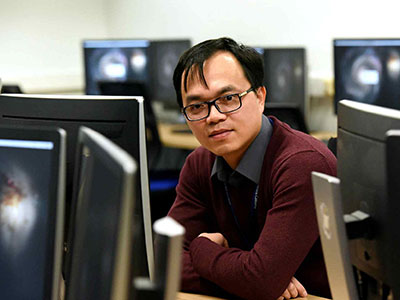Course overview
Computing and cyber security courses
Learn more about our courses in computing and cybersecurity.
Computer science skills are in high demand across industries including financial organisations, software houses, communications companies, data warehouses, multinational companies, governmental agencies, computer games, manufacturing and healthcare.
You study programming, mobile development, network management, systems security, and artificial intelligence systems, and develop skills in data processing, storage, and data transmission.
This course includes a foundation year - ideal if you need additional preparation or if you don't have sufficient grades to join Year 1 of a degree.
Top reasons to study computer science at Teesside
- British Computer Society (BCS) academic membership: get free BCS membership to accelerate your career path with CV builder tools, e-learning courses, mentorships programmes, jobs boards and volunteering opportunities.
- Industry links: work on live industry briefs, competitions and hackathons with companies including Cisco, Cubic Transportation Systems, Sage, TUI, Atombank, HMRC and Waterstons.
- State-of-the-art facilities: learn in industry-standard computing labs with specialist equipment used to undertake development projects and build innovative prototypes.
- Career-ready: our ExpoSeries of events allow you to showcase your skills to industry professionals who are seeking to recruit new and rising talent.
- Quality teaching: we are ranked 4th for Teaching Quality for Computer Science in the Sunday Times Good University Guide (114 institutions were ranked, tees.ac.uk/source).
This course is also offered at our Teesside University London campus. Please note, the structure, content and delivery model is different, visit tees.ac.uk/london for full details.
Experience a taster lecture in Artificial Intelligence
Get a taste of student life before you join us.
Find out more about our taster lecture
Course details
Course structure
Foundation year core modules
Computational Thinking and Mathematics
Study the fundamental concepts of problem-solving, algorithms and data structure, and how they can be integrated to create solutions to complex computational tasks.
You use classic puzzles and recreational games to demonstrate the fundamental building blocks of algorithms. Develop your knowledge of design principles and your proficiency in creating algorithmic procedures by learning to think computationally when solving puzzles, and creating routines for playing simple computer-enabled games.
This is a 30-credit module.
Working in small teams, you design, develop and demonstrate a software solution that relates to an agreed specification following an agile development methodology.
This is a 30-credit module.
Learn the tools, techniques and methods you need to develop information systems such as gathering requirements, requirements modelling, designing data models and implementing a solution.
This is a 30-credit module.
Gain an introduction to programming if you have little or no experience of it. You use tools that are easily available, easy to use and familiar to anyone who's used a computer. Learn how programming language constructs are applied to increasing complex problems.
This is a 30-credit module.
Year 1 core modules
Learn about the maths, algorithms and data structures that are essential for computer science and computer games – putting first principles into an applied context.
This module is closely linked to our programming modules and prepares you with essential, transferable problem-solving skills.
This is a 30-credit module.
You consider key aspects of the software development process - designing solutions, writing application code, developing documentation and formal approaches to testing. And you develop the essential skills you need to develop software applications such as following best practices used by industry and the wider programming community.
This is a 30-credit module.
Cover a full range of computer and network security issues. Study systematic approaches to managing security risks, identification and authentication, elementary cryptography, network technology and relevant security issues. Learn about the basic network technology including deploying routers, switches, firewalls, cabling and servers as well as communication protocols and topologies. And understand how they're used and how they function in the real world.
This is a 30-credit module.
To produce a successful, robust, user-friendly system or application, you need to start by analysing your stakeholders’ requirements and developing a detailed design.
Study the concepts and techniques of analysing and designing systems. Then you can break down and simplify complex systems, and represent them visually using industry-standard approaches. In industry, these visual models are used to communicate designs to developers and stakeholders before implementation.
You study other techniques to design and implement relational databases as part of an information system. Using data-modelling techniques, you learn to define how the system stores data and interacts with it.
This module has a strong emphasis on professional practice and transferrable practical skills, such as communicating design, structuring workflows with process models and gathering requirements - this provides you with some of the essential skills you need in industry.
This is a 30-credit module.
Year 2 core modules
Cognitive technologies, such as artificial intelligence (AI), are increasingly being used to solve business problems. AI is concerned with understanding and building intelligent entities – machines that can compute how to act effectively and safely in new situations.
You are introduced to AI, discussing real-world applications and its transformative power in our daily life. You consider the fundamental concepts of AI, common frameworks used in analysing and designing intelligent systems, using generic algorithms to implement these systems and major problem-solving techniques. You develop knowledge to understand how to address AI problems, studying a range of AI techniques, applications and developing solutions.
You learn about popular AI applications, including game design, virtual agents and robotics. And you consider the benefits of using AI, such as how to enhance efficiency, productivity and reduce costs.
This is a 30-credit module.
You develop a solution, proposal, product or service in response to an enterprise challenge set by industry partners or business clients.
Working in small teams, you determine the project aims, objectives, roles, tasks, deliverables, schedules and documentation. You take a professional approach, informed by innovative industry practice, to deliver a successful project that meets the set challenge.
You develop a solution, proposal, product or service, pitching it to academics and industry experts. You reflect on the project process as a whole and review sustainability, diversity, ethical and legal issues, and evaluate team members’ performance.
This is a 30-credit module.
Relational and NoSQL Databases
Learn how to design and implement database applications to meet business needs using industry-standard database technologies. Use a case study to follow the system development lifecycle, and develop a server database application for a real-world scenario. Explore rational and NoSQL database technologies to design and build solutions.
This is a 30-credit module.
Design and construct web applications and web services, and understand the role they play in the architecture of enterprise-style software systems.
Compared to traditional static sites, web applications serve dynamic content or fully asynchronous single-page applications to bring the web alive. Web services use industry-standard interfaces to make their capabilities reusable by third parties, particularly apps running on mobile devices. These technologies are the cornerstone of the modern web.
Explore the underlying technologies of how the web works and investigate how to use professional tools to construct web apps and web services. Study the principles, patterns, libraries, frameworks and techniques to engineer good-quality software components ready to use in enterprise-style software system architectures. Build on and extend your previous programming experience, and knowledge and understanding of data modelling and persistence.
This is a 30-credit module.
Optional work placement year
You have the option to spend one year in industry learning and developing your skills. We encourage and support you with applying for a placement, job hunting and networking.
You gain experience favoured by graduate recruiters and develop your technical skillset. You also obtain the transferable skills required in any professional environment, including communication, negotiation, teamwork, leadership, organisation, confidence, self-reliance, problem-solving, being able to work under pressure, and commercial awareness.
Many employers view a placement as a year-long interview, therefore placements are increasingly becoming an essential part of an organisation's pre-selection strategy in their graduate recruitment process. Benefits include:
· improved job prospects
· enhanced employment skills and improved career progression opportunities
· a higher starting salary than your full-time counterparts
· a better degree classification
· a richer CV
· a year's salary before completing your degree
· experience of workplace culture
· the opportunity to design and base your final-year project within a working environment.
If you are unable to secure a work placement with an employer, then you simply continue on a course without the work placement.
Final-year core modules
Machine learning is an important part of artificial intelligence learning to adapt to unforeseen circumstances.
Machine learning draws from statistics and probability theory as the fundamental task is to make inferences from data samples. It's essential to have contributions from other areas of computer science to represent efficient tasks, learning algorithms and inference procedures.
You're exposed to a range of tasks and techniques in machine learning. And you get a practical introduction to neural networks, investigating their use in deep learning.
This is a 30-credit module.
Cloud computing enables companies to avoid the infrastructure and maintenance costs associated with buying and running their own dedicated hardware and software platforms. Moving software and software development to the cloud creates new challenges and opportunities for software developers.
You explore cloud-native software architectures, use cloud-based platforms and infrastructures, and study professional DevOps practices used to develop and deploy complete software systems.
This is a 30-credit module.
Produce a substantial artefact related to the computing field, and write a report and commented walk-through video, with supervision from our academic staff.
You are guided to develop your work-discipline and your professional outlook. Taking full responsibility for your project, carry out an in-depth exploration of a chosen subject area that demonstrates your ability to scope the project, plan, research, analyse, synthesise, and creatively apply and execute what you've already studied. Consider its risks, security and sustainability as well as the legal, social, ethical, equality, diversity and inclusion issues.
You develop your professional skills in time management, communication, problem solving and critical thinking.
This is a 60-credit module.
Modules offered may vary.
How you learn
You learn through lectures, seminars and practical sessions.
How you are assessed
You are assessed through coursework assignments, project reports and formal exams.
Our Disability Services team provide an inclusive and empowering learning environment and have specialist staff to support disabled students access any additional tailored resources needed. If you have a specific learning difficulty, mental health condition, autism, sensory impairment, chronic health condition or any other disability please contact a Disability Services as early as possible.
Find out more about our disability services
Find out more about financial support
Find out more about our course related costs
Entry requirements
Entry requirements
Any combination of level 3 qualifications. Each application is considered on a case-by-case basis.
We may also be able to help you meet the entry requirements through our Winter and Summer University modules.
For general information please see our overview of entry requirements.
Are you an international student looking for a foundation course offering both academic and English language content? Explore your options with our International Study Centre.
International applicants can find out what qualifications they need by visiting Your Country.
You can gain considerable knowledge from work, volunteering and life. Under recognition of prior learning (RPL) you may be awarded credit for this which can be credited towards the course you want to study.
Find out more about RPL
Employability
Career opportunities
There are varied job roles available to computer science graduates including IT consultant, information systems manager, systems analyst, software developer, computer network architect, web developer, and IT project manager.
Our graduates have secured jobs in organisations including IBM, Amazon, Schlumberger, Ordnance Survey, Codemasters, npower, Cisco, HMRC, NHS, Traceco and Clicksco.
The optional work placement year allows you to keep up-to-date with the latest technical developments and techniques. Our students have been placed in organisations such as Dupont, Accenture, General Electric, Nissan, Nicander, Red Embedded, Microsoft, Intel, Thomson Reuters, Glaxo Smith Kline and GCHQ.
Information for international applicants
Qualifications
International applicants - find out what qualifications you need by selecting your country below.
Select your country:
Useful information
Visit our international pages for useful information for non-UK students and applicants.




